- Home
- Annie Proulx
Brokeback Mountain Page 3
Brokeback Mountain Read online
Page 3
In May of 1983 they spent a few cold days at a series of little icebound, no-name high lakes, then worked across into the Hail Strew River drainage.
Going up, the day was fine but the trail deep-drifted and slopping wet at the margins. They left it to wind through a slashy cut, leading the horses through brittle branchwood, Jack, the same eagle feather in his old hat, lifting his head in the heated noon to take the air scented with resinous lodge-pole, the dry needle duff and hot rock, bitter juniper crushed beneath the horses’ hooves. Ennis, weather-eyed, looked west for the heated cumulus that might come up on such a day but the boneless blue was so deep, said Jack, that he might drown looking up.
Around three they swung through a narrow pass to a southeast slope where the strong spring sun had had a chance to work, dropped down to the trail again which lay snowless below them. They could hear the river muttering and making a distant train sound a long way off. Twenty minutes on they surprised a black bear on the bank above them rolling a log over for grubs and Jack’s horse shied and reared, Jack saying “Wo! Wo!” and Ennis’s bay dancing and snorting but holding. Jack reached for the .30-06 but there was no need; the startled bear galloped into the trees with the lumpish gait that made it seem it was falling apart.
The tea-colored river ran fast with snowmelt, a scarf of bubbles at every high rock, pools and setbacks streaming. The ochre-branched willows swayed stiffly, pollened catkins like yellow thumbprints. The horses drank and Jack dismounted, scooped icy water up in his hand, crystalline drops falling from his fingers, his mouth and chin glistening with wet.
“Get beaver fever doin that,” said Ennis, then, “Good enough place,” looking at the level bench above the river, two or three fire-rings from old hunting camps. A sloping meadow rose behind the bench, protected by a stand of lodgepole. There was plenty of dry wood. They set up camp without saying much, picketed the horses in the meadow. Jack broke the seal on a bottle of whiskey, took a long, hot swallow, exhaled forcefully, said, “That’s one a the two things I need right now,” capped and tossed it to Ennis.
On the third morning there were the clouds Ennis had expected, a grey racer out of the west, a bar of darkness driving wind before it and small flakes. It faded after an hour into tender spring snow that heaped wet and heavy. By nightfall it turned colder. Jack and Ennis passed a joint back and forth, the fire burning late, Jack restless and bitching about the cold, poking the flames with a stick, twisting the dial of the transistor radio until the batteries died.
Ennis said he’d been putting the blocks to a woman who worked part-time at the Wolf Ears bar in Signal where he was working now for Stoutamire’s cow and calf outfit, but it wasn’t going anywhere and she had some problems he didn’t want. Jack said he’d had a thing going with the wife of a rancher down the road in Childress and for the last few months he’d slank around expecting to get shot by Lureen or the husband, one. Ennis laughed a little and said he probably deserved it. Jack said he was doing all right but he missed Ennis bad enough sometimes to make him whip babies.
The horses nickered in the darkness beyond the fire’s circle of light. Ennis put his arm around Jack, pulled him close, said he saw his girls about once a month, Alma Jr. a shy seventeen-year-old with his beanpole length, Francine a little live wire. Jack slid his cold hand between Ennis’s legs, said he was worried about his boy who was, no doubt about it, dyslexic or something, couldn’t get anything right, fifteen years old and couldn’t hardly read, he could see it though goddamn Lureen wouldn’t admit to it and pretended the kid was o.k., refused to get any bitchin kind a help about it. He didn’t know what the fuck the answer was. Lureen had the money and called the shots.
“I used a want a boy for a kid,” said Ennis, undoing buttons, “but just got little girls.”
“I didn’t want none a either kind,” said Jack. “But fuck-all has worked the way I wanted. Nothin never come to my hand the right way.” Without getting up he threw deadwood on the fire, the sparks flying up with their truths and lies, a few hot points of fire landing on their hands and faces, not for the first time, and they rolled down into the dirt. One thing never changed: the brilliant charge of their infrequent couplings was darkened by the sense of time flying, never enough time, never enough.
A day or two later in the trailhead parking lot, horses loaded into the trailer, Ennis was ready to head back to Signal, Jack up to Lightning Flat to see the old man. Ennis leaned into Jack’s window, said what he’d been putting off the whole week, that likely he couldn’t get away again until November after they’d shipped stock and before winter feeding started.
“November. What in hell happened a August? Tell you what, we said August, nine, ten days. Christ, Ennis! Whyn’t you tell me this before? You had a fuckin week to say some little word about it. And why’s it we’re always in the friggin cold weather? We ought a do somethin. We ought a go south. We ought a go to Mexico one day.”
“Mexico? Jack, you know me. All the travelin I ever done is goin around the coffeepot lookin for the handle. And I’ll be runnin the baler all August, that’s what’s the matter with August. Lighten up, Jack. We can hunt in November, kill a nice elk. Try if I can get Don Wroe’s cabin again. We had a good time that year.”
“You know, friend, this is a goddamn bitch of a unsatisfactory situation. You used a come away easy. It’s like seein the pope now.”
“Jack, I got a work. Them earlier days I used a quit the jobs. You got a wife with money, a good job. You forget how it is bein broke all the time. You ever hear a child support? I been payin out for years and got more to go. Let me tell you, I can’t quit this one. And I can’t get the time off. It was tough gettin this time—some a them late heifers is still calvin. You don’t leave then. You don’t. Stoutamire is a hell-raiser and he raised hell about me takin the week. I don’t blame him. He probly ain’t got a night’s sleep since I left. The trade-off was August. You got a better idea?”
“I did once.” The tone was bitter and accusatory.
Ennis said nothing, straightened up slowly, rubbed at his forehead; a horse stamped inside the trailer. He walked to his truck, put his hand on the trailer, said something that only the horses could hear, turned and walked back at a deliberate pace.
“You been a Mexico, Jack?” Mexico was the place. He’d heard. He was cutting fence now, trespassing in the shoot-em zone.
“Hell yes, I been. Where’s the fuckin problem?” Braced for it all these years and here it came, late and unexpected.
“I got a say this to you one time, Jack, and I ain’t foolin. What I don’t know,” said Ennis, “all them things I don’t know could get you killed if I should come to know them.”
“Try this one,” said Jack, “and I’ll say it just one time. Tell you what, we could a had a good life together, a fuckin real good life. You wouldn’t do it, Ennis, so what we got now is Brokeback Mountain. Everthing built on that. It’s all we got, boy, fuckin all, so I hope you know that if you don’t never know the rest. Count the damn few times we been together in twenty years. Measure the fuckin short leash you keep me on, then ask me about Mexico and then tell me you’ll kill me for needin it and not hardly never gettin it. You got no fuckin idea how bad it gets. I’m not you. I can’t make it on a couple a high-altitude fucks once or twice a year. You’re too much for me, Ennis, you son of a whoreson bitch. I wish I knew how to quit you.”
Like vast clouds of steam from thermal springs in winter the years of things unsaid and now unsayable—admissions, declarations, shames, guilts, fears—rose around them. Ennis stood as if heart-shot, face grey and deep-lined, grimacing, eyes screwed shut, fists clenched, legs caving, hit the ground on his knees.
“Jesus,” said Jack. “Ennis?” But before he was out of the truck, trying to guess if it was heart attack or the overflow of an incendiary rage, Ennis was back on his feet and somehow, as a coat hanger is straightened to open a locked car and then bent again to its original shape, they torqued things almost to where they had been, for what they’d said was no news. Nothing ended, nothing begun, nothing resolved.
What Jack remembered and craved in a way he could neither help nor understand was the time that distant summer on Brokeback when Ennis had come up behind him and pulled him close, the silent embrace satisfying some shared and sexless hunger.
They had stood that way for a long time in front of the fire, its burning tossing ruddy chunks of light, the shadow of their bodies a single column against the rock. The minutes ticked by from the round watch in Ennis’s pocket, from the sticks in the fire settling into coals. Stars bit through the wavy heat layers above the fire. Ennis’s breath came slow and quiet, he hummed, rocked a little in the sparklight and Jack leaned against the steady heartbeat, the vibrations of the humming like faint electricity and, standing, he fell into sleep that was not sleep but something else drowsy and tranced until Ennis, dredging up a rusty but still useable phrase from the childhood time before his mother died, said, “Time to hit the hay, cowboy. I got a go. Come on, you’re sleepin on your feet like a horse,” and gave Jack a shake, a push, and went off in the darkness. Jack heard his spurs tremble as he mounted, the words “see you tomorrow,” and the horse’s shuddering snort, grind of hoof on stone.
Later, that dozy embrace solidified in his memory as the single moment of artless, charmed happiness in their separate and difficult lives. Nothing marred it, even the knowledge that Ennis would not then embrace him face to face because he did not want to see nor feel that it was Jack he held. And maybe, he thought, they’d never got much farther than that. Let be, let be.
Ennis didn’t know about the accident for months until his postcard to Jack saying that November still looked like the first chance came back stamped DECEASED. He called Jack’s number in Childress, something he had done only once before when Alma divorced him and Jack had misunderstood the reason for the call, had driven twelve hundred miles north for nothing. This would be all right, Jack would answer, had to answer. But he did not. It was Lureen and she said who? who is this? and when he told her again she said in a level voice yes, Jack was pumping up a flat on the truck out on a back road when the tire blew up. The bead was damaged some how and the force of the explosion slammed the rim into his face, broke his nose and jaw and knocked him unconscious on his back. By the time someone came along he had drowned in his own blood.
No, he thought, they got him with the tire iron.
“Jack used to mention you,” she said. “You’re the fishing buddy or the hunting buddy, I know that. Would have let you know,” she said, “but I wasn’t sure about your name and address. Jack kept most a his friends’ addresses in his head. It was a terrible thing. He was only thirty-nine years old.”
The huge sadness of the northern plains rolled down on him. He didn’t know which way it was, the tire iron or a real accident, blood choking down Jack’s throat and nobody to turn him over. Under the wind drone he heard steel slamming off bone, the hollow chatter of a settling tire rim.
“He buried down there?” He wanted to curse her for letting Jack die on the dirt road.
The little Texas voice came slip-sliding down the wire. “We put a stone up. He use to say he wanted to be cremated, ashes scattered on Brokeback Mountain. I didn’t know where that was. So he was cremated, like he wanted, and like I say, half his ashes was interred here, and the rest I sent up to his folks. I thought Brokeback Mountain was around where he grew up. But knowing Jack, it might be some pretend place where the bluebirds sing and there’s a whiskey spring.”
“We herded sheep on Brokeback one summer,” said Ennis. He could hardly speak.
“Well, he said it was his place. I thought he meant to get drunk. Drink whiskey up there. He drank a lot.”
“His folks still up in Lightnin Flat?”
“Oh yeah. They’ll be there until they die. I never met them. They didn’t come down for the funeral. You get in touch with them. I suppose they’d appreciate it if his wishes was carried out.”
No doubt about it, she was polite but the little voice was cold as snow.
The road to Lightning Flat went through desolate country past a dozen abandoned ranches distributed over the plain at eight- and ten-mile intervals, houses sitting blank-eyed in the weeds, corral fences down. The mailbox read John C. Twist. The ranch was a meagre little place, leafy spurge taking over. The stock was too far distant for him to see their condition, only that they were black baldies. A porch stretched across the front of the tiny brown stucco house, four rooms, two down, two up.
Ennis sat at the kitchen table with Jack’s father. Jack’s mother, stout and careful in her movements as though recovering from an operation, said, “Want some coffee, don’t you? Piece a cherry cake?”
“Thank you, ma’am, I’ll take a cup a coffee but I can’t eat no cake just now.”
The old man sat silent, his hands folded on the plastic tablecloth, staring at Ennis with an angry, knowing expression. Ennis recognized in him a not uncommon type with the hard need to be the stud duck in the pond. He couldn’t see much of Jack in either one of them, took a breath.
“I feel awful bad about Jack. Can’t begin to say how bad I feel. I knew him a long time. I come by to tell you that if you want me to take his ashes up there on Brokeback like his wife says he wanted I’d be proud to.”
There was a silence. Ennis cleared his throat but said nothing more.
The old man said, “Tell you what, I know where Brokeback Mountain is. He thought he was too goddamn special to be buried in the family plot.”
Jack’s mother ignored this, said, “He used a come home every year, even after he was married and down in Texas, and help his daddy on the ranch for a week, fix the gates and mow and all. I kept his room like it was when he was a boy and I think he appreciated that. You are welcome to go up in his room if you want.”
The old man spoke angrily. “I can’t get no help out here. Jack used a say, ’Ennis del Mar,’ he used a say, ’I’m goin a bring him up here one a these days and we’ll lick this damn ranch into shape.’ He had some half-baked idea the two a you was goin a move up here, build a log cabin and help me run this ranch and bring it up. Then, this spring he’s got another one’s goin a come up here with him and build a place and help run the ranch, some ranch neighbor a his from down in Texas. He’s goin a split up with his wife and come back here. So he says. But like most a Jack’s ideas it never come to pass.”
So now he knew it had been the tire iron. He stood up, said, you bet he’d like to see Jack’s room, recalled one of Jack’s stories about this old man. Jack was dick-clipped and the old man was not; it bothered the son who had discovered the anatomical disconformity during a hard scene. He had been about three or four, he said, always late getting to the toilet, struggling with buttons, the seat, the height of the thing and often as not left the surroundings sprinkled down. The old man blew up about it and this one time worked into a crazy rage. “Christ, he licked the stuffin out a me, knocked me down on the bathroom floor, whipped me with his belt. I thought he was killin me. Then he says, ’You want a know what it’s like with piss all over the place? I’ll learn you,’ and he pulls it out and lets go all over me, soaked me, then he throws a towel at me and makes me mop up the floor, take my clothes off and warsh them in the bathtub, warsh out the towel, I’m bawlin and blubberin. But while he was hosin me down I seen he had some extra material that I was missin. I seen they’d cut me different like you’d crop a ear or scorch a brand. No way to get it right with him after that.”
The bedroom, at the top of a steep stair that had its own climbing rhythm, was tiny and hot, afternoon sun pounding through the west window, hitting the narrow boy’s bed against the wall, an ink-stained desk and wooden chair, a b.b. gun in a hand-whittled rack over the bed. The window looked down on the gravel road stretching south and it occurred to him that for his growing-up years that was the only road Jack knew. An ancient magazine photograph of some dark-haired movie star was taped to the wall beside the bed, the skin tone gone magenta. He could hear Jack’s mother downstairs running water, filling the kettle and setting it back on the stove, asking the old man a muffled question.
The closet was a shallow cavity with a wooden rod braced across, a faded cretonne curtain on a string closing it off from the rest of the room. In the closet hung two pairs of jeans crease-ironed and folded neatly over wire hangers, on the floor a pair of worn packer boots he thought he remembered. At the north end of the closet a tiny jog in the wall made a slight hiding place and here, stiff with long suspension from a nail, hung a shirt. He lifted it off the nail. Jack’s old shirt from Brokeback days. The dried blood on the sleeve was his own blood, a gushing nosebleed on the last afternoon on the mountain when Jack, in their contortionistic grappling and wrestling, had slammed Ennis’s nose hard with his knee. He had staunched the blood which was everywhere, all over both of them, with his shirtsleeve, but the staunching hadn’t held because Ennis had suddenly swung from the deck and laid the ministering angel out in the wild columbine, wings folded.
The shirt seemed heavy until he saw there was another shirt inside it, the sleeves carefully worked down inside Jack’s sleeves. It was his own plaid shirt, lost, he’d thought, long ago in some damn laundry, his dirty shirt, the pocket ripped, buttons missing, stolen by Jack and hidden here inside Jack’s own shirt, the pair like two skins, one inside the other, two in one. He pressed his face into the fabric and breathed in slowly through his mouth and nose, hoping for the faintest smoke and mountain sage and salty sweet stink of Jack but there was no real scent, only the memory of it, the imagined power of Brokeback Mountain of which nothing was left but what he held in his hands.

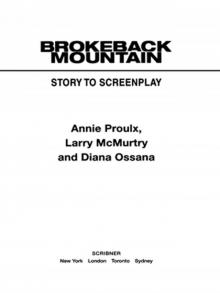 Brokeback Mountain
Brokeback Mountain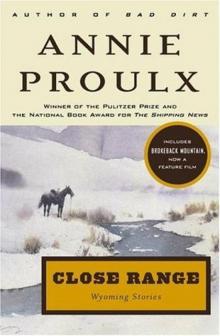 Close Range
Close Range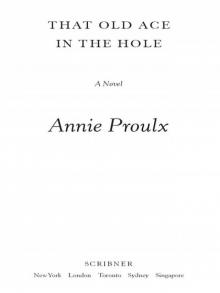 That Old Ace in the Hole
That Old Ace in the Hole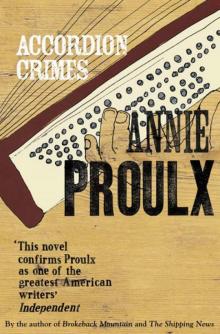 Accordion Crimes
Accordion Crimes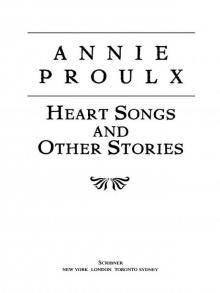 Heart Songs and Other Stories
Heart Songs and Other Stories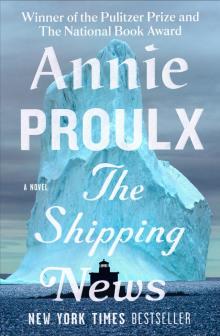 The Shipping News
The Shipping News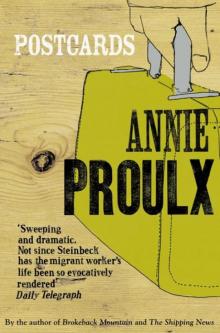 Postcards
Postcards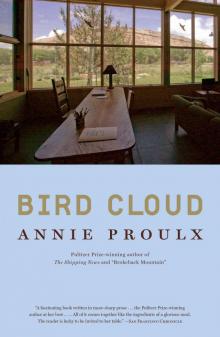 Bird Cloud
Bird Cloud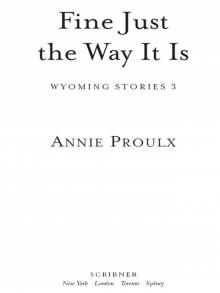 Fine Just the Way It Is
Fine Just the Way It Is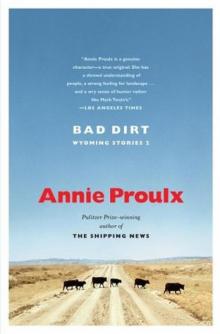 Bad Dirt
Bad Dirt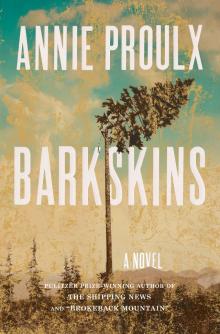 Barkskins
Barkskins BrokebackMountain
BrokebackMountain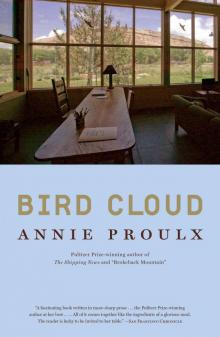 Bird Cloud: A Memoir of Place
Bird Cloud: A Memoir of Place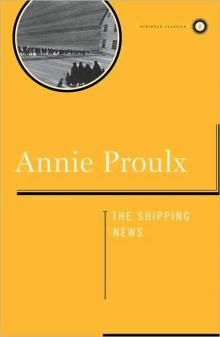 Shipping News_A Novel
Shipping News_A Novel